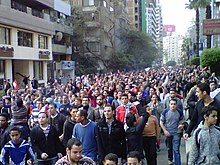Waithood

Waithood (a portmanteau of "wait" and "adulthood") is a period of stagnation in the lives of young unemployed college graduates in the Middle East & North Africa (MENA), India, etc. regions, described as "a kind of prolonged adolescence",[1] and "the bewildering time in which large proportions of youth spend their best years waiting. It is a phase in which the difficulties youth face in each of these interrelated spheres of life result in a debilitating state of helplessness and dependency. One commentator argues, waithood can be best understood by examining outcomes and linkages across five different sectors: education, employment, housing, credit, and marriage.[2]
Waithood is applicable only to college educated people who are not compelled to settle in blue collar jobs due to the support from family elders or resources. Waithood is considered to be a difficult and unpleasant period in life; without work, young people are unable to progress in other areas of their development, such as purchasing a home and getting married.[3][4]
See also
|
|
|
References
- ^ Diane Singerman, "Thirty and Single, Coping with Delayed Marriage", The Middle East Youth Initiative (February 2008)
- ^ Navtej Dhillon, "Middle East Youth Bulge: Challenge or Opportunity?", The Brookings Institution (May 2008)
- ^ "Understanding Waithood", Middle East Youth Initiative
- ^ Hilary Silver, "Social Exclusion: Comparative Analysis of Europe and Middle East Youth", Middle East Youth Initiative Working Paper (September 2007)
